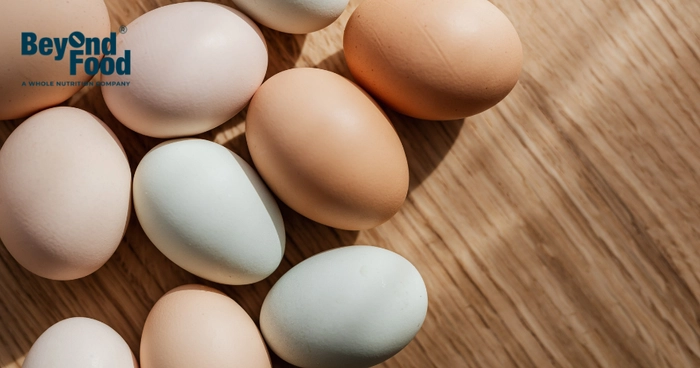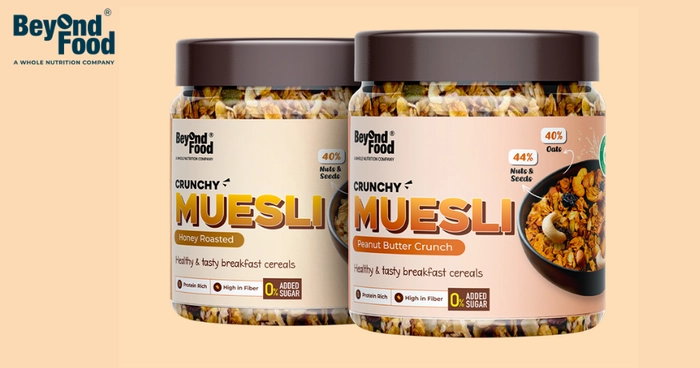No products in the cart.
How Much Protein Per Day is Needed to Build Muscles?

- Updated on :
Have you ever been in front of the mirror gracefully showing off your six-pack but wondered why all that sweat in the gym could not give you those bulging muscles you wanted? You are not alone in this mission of strength and definition.
Let us resolve your fitness riddle together! In this blog, we discuss how muscle building works on a scientific level, collecting the facts and focusing on the core of the issue. Continue reading, though, because we are going to solve this muscle mystery while providing you with theoretical knowledge and also practical suggestions.
Role of Proteins in Muscle Growth
It is pertinent to note that Protein is essential for muscle repair and growth. When you exercise, especially during strength training, your muscle fibres undergo stress, leading to microscopic tears. It helps repair these tears, thereby assisting muscle recovery and promoting substantial growth. This critical process for building muscle mass is known as muscle protein synthesis (MPS).
Amount of Protein You Should Consume on a Regular Basis
The amount of Protein you should consume depends on factors like age, sex, weight, and the intensity of your activity.
In general, the intake in adults who do not regularly work out should be at least 0.8 grams for every kilogram they weigh per day. For example, a person weighing 60 kg should consume at least 48 grams daily (60 kg X 0.8 g/kg).
Strength training and weightlifting (both of which fall under the same category of muscle building) tend to require more dietary Protein. The recommended range for this more active group is between 1.2g and 1.8g per kilogram of body weight. Therefore, a 60 kg individual engaging in these activities should consume between 72 g and 108 g per day.
Time and Distribution
The timing and distribution of the intake of Protein during the day are significant factors of importance in general health, muscle conservation, and growth.
-
Spread Your Intake: You should eat Protein evenly throughout the day in smaller portions. Ideally, have about 20-30 grams in every meal, as studies have demonstrated that this can release the maximum amount of muscle protein synthesis.
-
Post-Workout Protein: Your muscles can absorb nutrients more quickly, right after a workout. A protein-rich food or shake taken within two hours of exercise is very effective in repairing muscles and aiding muscle growth.
-
Protein Before Bed: A moderate intake of protein-rich food before bedtime helps spare overnight muscle repair and development because of the slow and gradual digestion and absorption process.
Breakdown of the Primary Sources of Protein
If meat is your thing, then you can rock with mouthwatering chicken breasts or even your favourite heart-smart salmon. Dairy fans can be sure to have creamy Greek yoghurt and different cheeses as snacks. When consumed in proportion, this is also Protein for weight loss.
Plant-based? A mixture of beans and lentils gives ample options for salads with stews. These foods are an excellent choice of Protein for weight loss. Nuts are also excellent substitutes for meat, and they can now be boasted for their capacity to adapt to any flavour quickly.
You may not want to miss out on protein powders if you are always on the move. Yes, shaking can help to maintain energy levels, especially when you are on the go. It brings together a variety of sources and ensures that meals remain attractive and healthy regardless of whether you are planning a complex meal or just grabbing a snack.
Protein-Rich Foods To Be Considered In a Busy Schedule
It would help if you incorporated easy-to-eat, protein-rich food into a busy lifestyle to boost your energy.
Here are some practical and locally accessible options:
-
Chickpeas and Peanuts: The staples in Indian snack culture, such as roasted chana and peanuts, are portable and protein-rich protein foods.
-
Moong Dal and Sprouts: Moong dal sprouts are a nutritious, protein-packed snack. This Protein for weight loss is also incredibly light and easy to carry, making it perfect for snacking.
-
Hard-Boiled Eggs: Eggs are readily available and can be cooked in various forms. They are a great portable protein-rich food that does not require Masterchef cooking skills. It is also the best way to consume Protein for weight loss.
-
Soy Milk: Soy milk is a plant-based Protein that can be a convenient option when you are on the move. This Protein for weight loss comes in a variety of flavours, and you can also make it yourself at home.
-
Makhana (Fox Nuts): Makhana is an on-the-go or munching snack known for its high Protein and low-calorie content. It is a food known as a protein for weight loss.
-
Protein Bars: Many Indian brands make high-protein bars with indigenous ingredients. This protein-rich food option is also easy to carry and munch on.
-
Yoghurt or Curd: Yoghurt is a good source and can be a refreshing snack during a busy day. Greek yoghurt is also an excellent protein-rich food option, as it will keep you full for a while.
-
Dry Fruits and Nuts: A small bag of almonds, walnuts, or pistachios can provide a quick protein for weight-loss fix and healthy fats. Dry Fruits and Nuts are easy to carry in your car, bag, or desk drawer and munch during the day.
Conclusion
This blog has outlined an approach that you need to modify depending on the amount of Protein you consume. Some things are not only about eating protein-rich food but also about taking the correct nutrients at the right time. You can approach a dietitian or a nutritionist to develop your dietary program.
So, if you want to stay in shape and live a healthier life, pay attention to your diet.






